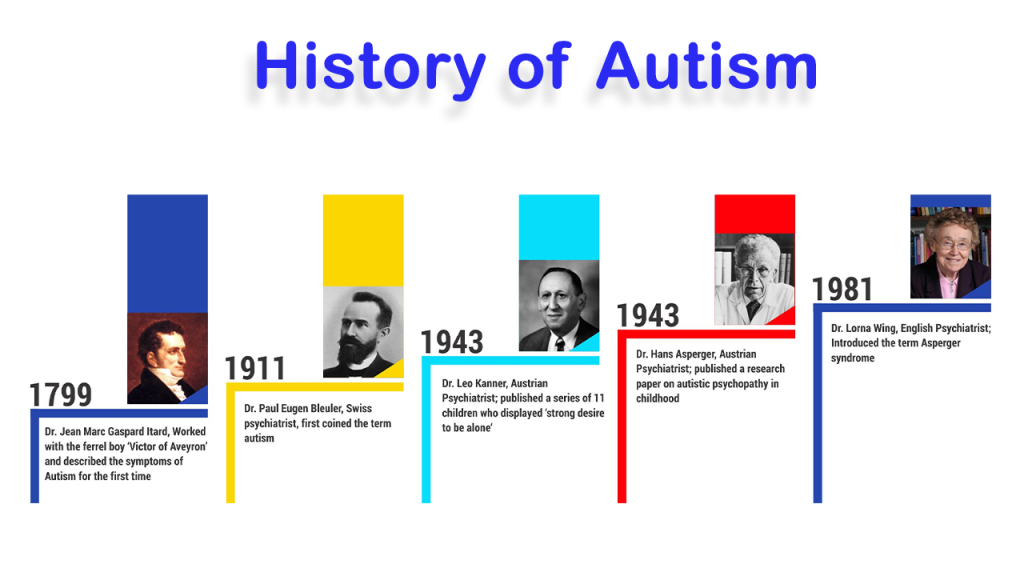In this article, I will discuss History of Autism, and How Autism Actually Evolved. As a neurodevelopmental disorder, autism impacts brain development in children. As a result, most people have trouble communicating, have problems interacting socially, and repeat certain behaviors. Also, their interests and activities may be severely limited. Epilepsy, sleep disorders, gastrointestinal abnormalities, and immune deficiencies are common co-occurring medical conditions with autism spectrum disorder. There are many mental health issues, including anxiety and depression. An individual’s quality of life can be severely affected by any of these conditions.
What To Know About Autism?
The same neurological differences and traits that now constitute autism can be seen in different cultures and times periods based on today’s nomenclature. Despite the fact that autism is not a new phenomenon, the way in which it is defined is constantly changing. Culture, gender, ability level, and social environment have been found to play a significant role in many people’s failure to pass traditional tests.
In most cultures, children are expected to look someone in the eye to show that they are paying attention, but direct eye contact may be impolite in some cultures and in some families. A child with an autistic trait cannot be identified in such a situation. An extremely shy child may not alarm their parents, as well. In addition, a child who learns to mimic their peers is likely to go unnoticed if their autistic traits are masked by mimicking.
A person who cannot speak is assumed not to understand language, similarly to someone who cannot control their body to accomplish simple tasks is assumed to be unwilling to do so. The diagnosis of autism is not always easy despite today’s clear criteria, especially when it is accompanied by co-occurring conditions such as intellectual disabilities, anxiety, ADHD, depression, OCD, CPTSD, bipolar disorder, borderline personality disorder, etc.
How Autism History Actually Evolved?
As a result of the study of schizophrenia, Swiss psychiatrist Eugen Bleuler coined the term autism, derived from the Greek word ‘autos’. In writing about a group of patients she had seen in a Moscow clinic, all of whom fit the current description of autism, Grunya Efimovna Sukhareva was inspired by the meaning of “withdrawn within oneself”. It is unfortunate that Sukhareva’s 1925 article has been overlooked for so long. While Hans Asperger may have read the article, he didn’t credit her when he published in 1944 about the autistic traits that would later be named after him.
It took Austrian-born American psychiatrist Leo Kanner from 1938 to 1943 to observe and describe eleven children diagnosed with autism. Kanner’s research contributed most of what we know about autism today. His concern for the treatment of child patients in institutions was also among the first among American psychiatrists.
Several studies have been conducted over the years to determine what may cause autism and how to prevent or cure it. Autism is considered to be a neurodevelopmental disorder at this point. There is no cure for this disease. It is still very early in the research process to find out the possible causes. People with autism spectrum disorders must have concomitant issues addressed if they are to improve their quality of life and happiness.
In many different countries, the DSM provides information on all recognized mental disorders produced by the American Psychiatric Association. According to the DSM, the fifth edition was published in 2013. There are several conditions included in autism spectrum disorder that previously had their own entries:
- Asperger’s Syndrome
- Autistic disorder
- Childhood disintegrative disorder
- Pervasive developmental disorder – not otherwise specified (PDD-NOS).
In recent years, self-advocacy has emerged as a movement aimed at increasing knowledge and acceptance of the neurodivergent. Adults who are autistic themselves can express from firsthand experience what it means to be autistic.
